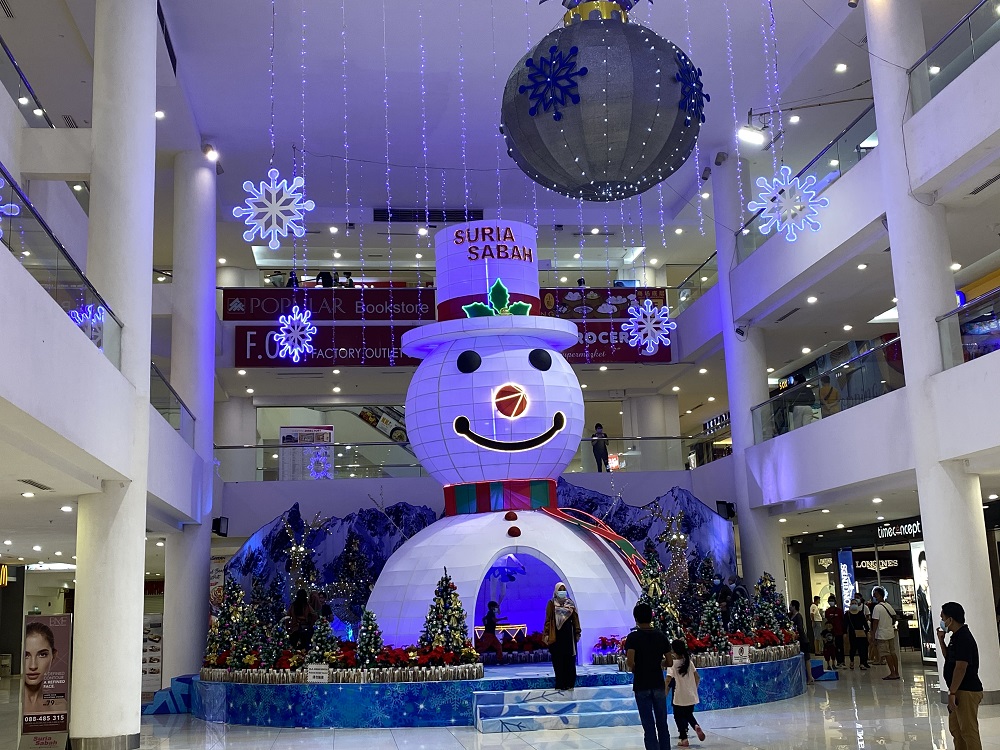KOTA KINABALU, Dec 21 ― After months of being a Covid-19 hotspot and still notching high daily infections, Sabahans are desperately looking to end the year with some cheer, whether it be in the form of quality time with family, friends or spending on themselves.
Malls here, emptied of shoppers after two lockdowns, are starting to fill up again in the last few weeks of Advent as people rush to complete their Christmas and New Year shopping.
Retail outlets in the city surveyed by Malay Mail recorded a definite surge in sales these last few weeks after the government relaxed rules under the conditional movement control, including lifting the inter-district travel ban.
An executive of a popular shopping mall in the city told Malay Mail that its foot traffic in December to date is the highest compared to the last three months.
“We don’t have exact numbers but the sales and traffic on the weekend is almost comparable to the previous year’s. This is of course just one weekend, but it feels like momentum has picked up ahead of Christmas and the year end,” said the executive who spoke on the condition no names were published.
He said that while the city’s retail sector faced an all time low this year following the high of last year’s record breaking tourism arrivals, they were pleasantly surprised by the turn out of crowds which is the norm every year end.
“It’s not the same crowd of course, we don’t have the tourists, or the returning Sabahans from abroad and West Malaysia anymore. But it is still a positive uptick where we had braced for the worst.”
In general, electronics, computers and IT gadgets, home and kitchen appliances, mobile phones, home improvement items as well as groceries and personal health and care items have been doing well, despite competing with a burgeoning online market.
Even fashion stores have been recording sales as shoppers, cooped up for months, look to unleash and indulge in retail therapy.
“We were surprised that we have continued to have walk-in customers throughout the CMCO, albeit less. We stayed open the entire time, and I feel we were quite busy most days. Even we were scared of being exposed at one point, but I guess you get used to it,” said Nuraisyah, one of the staff at a popular high street retail outlet here.
Sabah minister Datuk Seri Masidi Manjun told Malay Mail the state government is relieved to see some semblance of normalcy return.

The Sabah government’s Covid-19 spokesman also said that despite the long queues and crowds, no incidence of breach of SOP has been reported.
“The business community is very grateful for the relaxation. It has been a challenging seven or eight months for the business community, to say the least. Many have closed their business while those surviving are eager to restart. Now this is their opportunity to salvage their business and consolidate where they can,” he said.
But even as some jubilate at seeing the queues of shoppers lining up to enter a mall recently, others are triggered by the lack of physical distancing observed.
“Everyone knows the government isn’t relaxing the SOP because it’s safe. It’s to keep businesses from shutting down totally. So it’s still not safe, and I cannot take the risk,” said Faridah Ali who was out on a necessary grocery run.
The mother of two said she shares a house with her mother and sister’s family and her apprehension at seeing other shoppers, including those with families, soaking in the festive atmosphere at the malls dressed up to reflect the season, was palpable.
Masidi said that such concerns were warranted, and that the government had given thorough consideration before deciding that it has to take a risk while balancing public and economic health.
“They have to go together. Some argue that if we don’t get rid of Covid first, businesses will also suffer in the end. But we cannot wait until there are zero cases before we open up. Somewhere along the way, we have to take a calculated risk, and hope that reviving the economy will not affect the fight against coronavirus,” he said.
“We trust that the people are responsible enough to care for their health and their families and will abide by the SOPs set,” he added.
While picnickers flock to the beaches and promenade along the coastal state capital and health enthusiasts can be seen smelling the flowers during their workouts, nature parks and other outdoor attractions are slower to regain their visitors.
Maklarin Lakim, director of Sabah Parks and the custodian of the state’s nature and marine parks, said domestic visitors are gradually returning. Current visitor numbers stand at a quarter of last year’s statistics.

“Many tourism operations are running at a complete loss or not open at all. The domestic market is very price sensitive so the margins are not there but business overheads remain the same,” said a veteran water sport operator in the state who asked not to be named.
He said that the SOPs, while understandable, can make it difficult for some tourism outfits to operate, such as those in the diving industry, whose overhead costs are high and restarting their business is not so simple.
He said operators like him were dealt a big blow from the loss of international tourists.
“The government no longer has any money to give out. They have treated tourism the same as all industry but clearly it needs more support which it doesn’t get ― appropriate wage and premises subsidies, utilities and general overhead assistance,” he said.
The business owner said that they have had queries from international groups who are interested, but they are unable to give a date as to when this will be possible.
“It’s hard to survive in this environment when you don’t see light at the end of the tunnel. Not even a proposed plan,” he said.



















